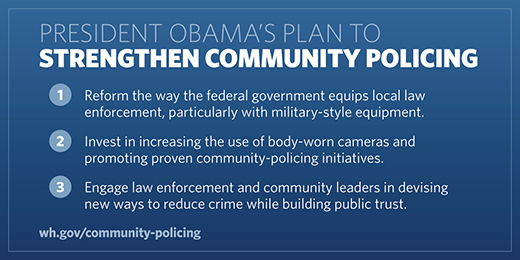Latest News
When Tribes Compete, Tribes Can Succeed
Posted by on December 4, 2014 at 6:17 PM ESTEd. note: This was originally posted on the U.S. Department of Labor's blog yesterday. See the original post here.
When President Obama made his first trip to Indian Country earlier this year, he told a compelling story about the impact federal investment and partnerships have in tribal communities. So I was privileged today to participate in the President’s sixth White House Tribal Nations Conference. Because of the challenges tribal communities continue to face with high rates of unemployment and barriers to opportunity, the conference was an important chance to discuss the Department of Labor and Administration’s efforts to create shared prosperity in Indian Country – and to hear from tribal leaders directly about their ideas for expanding and improving our work.
Learn more aboutThe Facts about the Affordable Care Act and Immigration Enforcement
Posted by on December 3, 2014 at 1:05 PM ESTThe ability to enroll in the Health Insurance Marketplace provided by the Affordable Care Act is open again. The deadline to enroll for coverage starting January 1, 2015 is December 15, 2014, and the deadline to enroll for coverage for the rest of 2015 is February 15, 2015.
In this period of open enrollment, it is important to remind the public of a message that we have delivered before:
We have heard that some Americans who are eligible to enroll in the Health Insurance Marketplace are reluctant to do so because they fear that the information they provide on their health coverage applications will be shared with immigration authorities and used to deport their undocumented family members. This is not true.
Since October 2013, Immigration and Customs Enforcement (or “ICE,” as the agency is commonly known) has had a policy that states that the information you present on your application to enroll for health insurance under the Affordable Care Act will not be the basis for pursuing an immigration enforcement action. This policy remains in effect. The policy is available, in English and in Spanish, on ICE’s public website; it can be found here. A policy like this is not new, as we have issued similar guidance when it came to the information provided for the 2010 Census and after natural disasters that impacted immigrant communities.
No one in America who is eligible should be afraid to apply for health coverage because they have a family with mixed immigration status. Enrolling in health coverage – and using the health insurance that this important law extends to eligible individuals – will not prevent your loved ones who are undocumented from getting a green card in the future or put family members who do not yet have a green card at risk.
We all deserve the security and the peace of mind that comes from having health coverage that’s there for us – that we can count on when we need it most The Obama Administration is doing everything we can to make sure we reach as many of those who are eligible to enroll as possible. I encourage eligible individuals to go to HealthCare.gov or CuidadodeSalud.gov to check out their options and enroll.
Learn more aboutLocal Food, Local Places: Bringing Expertise and Creative Thinking to Community Economic Development
Posted by on December 3, 2014 at 10:16 AM ESTAround the country, communities are seeking creative approaches to integrating entrepreneurship, environmental management, public health, and other place-based considerations into successful economic planning. Local food development can be one strategy.
The White House Rural Council and six federal agencies have selected 26 communities to participate in Local Foods, Local Places, a federal initiative providing direct technical support and expertise to community partners integrating local food systems into regional economic action plans. Under this effort, a team of federal agricultural, transportation, environmental, public health, and regional economic experts will work directly with communities to develop specific local food projects. These efforts will make a significant impact in the communities participating in the Local Foods, Local Places initiative.
Learn more about RuralBuilding Trust Between Communities and Local Police
Posted by on December 2, 2014 at 12:51 PM EST
Recent events in Ferguson, Missouri and around the country have grabbed the attention of the nation and the world, and have highlighted the importance of strong, collaborative relationships between local police and the communities that they protect.
The Administration announced new steps we’re taking to strengthen the relationships between law enforcement agencies and the communities they are obligated to protect and serve, including:
- Advancing the use of body worn cameras and promoting proven community policing initiatives
- Creating a new task force to promote expansion of the community-oriented policing model, which encourages strong relationships between law enforcement and the communities that they serve as a proven method of fighting crime
- Reforming how the federal government equips state and local law enforcement – particularly with military-style equipment
Get more details about these new actions below.
Helping to Boost Business Development for Native American Entrepreneurs
Posted by on December 1, 2014 at 10:19 AM ESTEd. note: This is cross-posted on the U.S. Small Business Administration's blog. See the original post here.
Native American Heritage Month is a time to reflect on the significant contributions the first Americans made to the establishment and growth of the U.S. The month is a time for Native people to share their culture, traditions, art, and ways of knowing with the entire nation. American Indians and Alaskan Natives were also the country’s first entrepreneurs, and the SBA is working hard every day to ensure that the entrepreneurial spirit of Native people continues to thrive.
The SBA’s Office of Native American Affairs offers a variety of Entrepreneurial Empowerment workshops nationwide. These workshops provide specialized training to new entrepreneurs and to established Native American businesses that are positioned to grow. They are developed to be culturally relevant and responsive to the challenges and needs of their communities.
This year alone we’ve held 19 workshops in 17 states, and more than 50 tribes have sent representatives. We also hold 8(a) business development workshops nationwide that focus on the unique rules and considerations for tribally and Native-owned corporations and organizations. In 2014, over 500 individuals representing 109 different tribal communities attended these sessions. In 2015, we will be increasing our number of workshops to ensure that we reach even more entrepreneurs throughout Indian Country.
Learn more aboutNational Tribal Day of Action for Affordable Care Act Enrollment
Posted by on November 24, 2014 at 3:40 PM ESTToday is the National Tribal Day of Action for Affordable Care Act Enrollment! Enrollment events are taking place across the nation and President Obama wants to ensure that every American Indian and Alaska Native has the information they need to take advantage of the health care options available under the health care law.Last week, Health and Human Services Secretary Sylvia Burwell spoke directly to tribal leaders and community members on the benefits of the Affordable Care Act for American Indians and Alaska Natives. The Secretary encouraged action from tribal leaders and community members, to get them, their friends, and their relatives enrolled! Today’s National Tribal Day of Action on Affordable Care Act enrollment is a perfect opportunity for Indian Country to rally with community partners in health to get yourself, your friends, and your family enrolled. Please join us in this effort to get covered with quality, reliable, and affordable health care insurance.Many Native Americans currently use an Indian Health Service (IHS) or a tribal health facility and that is not changing. But private health insurance offers new protections. Taking advantage of the new health insurance options provided by the Affordable Care Act can give American Indian and Alaska Native families the peace of mind of knowing they have comprehensive health insurance, even outside of the IHS system.If you’re a member of a federally-recognized tribe and under a certain income level, you might even qualify to pay reduced or no costs for a private health care policy, including low or zero out-of-pocket costs. Also, you can check to see if your state has expanded Medicaid, as you might now qualify!Many American Indians and Alaska Natives who have signed up for health insurance coverage through the healthcare marketplace report that they were surprised at just how affordable it can be to get covered. Many are eligible for assistance to lower or even eliminate their monthly insurance premiums. And, if you’re a member of a federally recognized Tribe and you choose to buy a private health insurance plan through the Health Insurance Marketplace, you may not have to pay any out-of-pocket costs like co-pays or deductibles. Many American Indian and Alaska Native families are also finding that they are now eligible for Medicaid or the Children’s Health Insurance Program. Overall, this can add up to more reliable and more comprehensive health care at little to no cost.The new health care law is another way the federal government is honoring its trust responsibility and obligations to Tribes. Ensuring that additional health care options are available for all Native Americans is simply another step in our ongoing efforts to promote well-being and economic prosperity in Indian Country.But you need to act to ensure that you and your family fully benefit from the new health care law. Every American Indian and Alaska Native should learn more about how the Affordable Care Act can benefit them as soon as possible. The best way to review your options is to go to HealthCare.gov/tribal. You can also visit your local IHS or tribal clinic, or you can call 1-800-318-2596.Raina Thiele is Associate Director of Intergovernmental Affairs at the White House.Learn more about Health CareObserving National Transgender Day of Remembrance
Posted by on November 20, 2014 at 9:30 AM ESTToday, November 20th, 2014, we observe National Transgender Day of Remembrance, as a solemn occasion to honor those who have lost their lives or experienced violence because of their gender identity or gender expression. We honor those who continue to experience violence and recommit to changing hearts and minds in order that all people are free from discrimination, hatred, and violence including transgender people.
Here at the White House, President Obama and the Administration are committed to continuing to support transgender Americans and protecting their rights from harm and oppression. This year marked the five-year anniversary of President Obama signing the Matthew Shepard and James Byrd Jr. Hate Crimes Prevention Act, critical civil rights legislation that have since expanded federal hate crimes protections to include gender, gender identity, disability, and sexual orientation.
At the recognition of the 5th Anniversary of the Shepard Byrd Act, we highlighted the fact that never before had gender identity or gender expression been included under federal protections against hate crimes. More importantly, we recognized the heroic leadership of transgender people across the country who made this federal inclusion possible, and who bravely worked to implement the law through education of communities and law enforcement officials across the country. We recognized Mara Keisling, a prominent leader in the transgender community for her work toward securing equal protection under law for transgender Americans. We also heard from Kylar Broadus on the continuing challenges in the way of preventing hate crimes, and his unique perspective experiencing discrimination based on gender identity plus race, reminding us of the need to address the intersectionality of these issues as we work together to prevent and respond to violent hate crimes more effectively.
Across President Obama’s Administration, agencies are taking steps to expand equality for transgender Americans:
- The U.S. Department of Health and Human Services overturned the exclusion of Medicare for transition-related care
- The U.S. Department of Education issued guidance clarifying that Title IX’s existing sex discrimination prohibition includes "gender identity or failure to conform to stereotypical notions of masculinity or femininity"
- The U.S. Department of Justice issued firm implementing guidelines for the first-ever non-discrimination provisions of the Violence Against Women Act (VAWA) reauthorization, providing clear guidelines prohibiting anti-LGBT discrimination under federal law
The continued commitment by President Obama and the Administration is a reflection of the unwavering and courageous leadership of the transgender community, whose lives are often in jeopardy as they come out or simply live their lives. Today, we stand proud of the work we’ve done as a community, but reaffirm that much work remains so that the countless innocent lives were not lost in vain. Together, we can continue to make that difference.
Aditi Hardikar is the Associate Director for the Office of Public Engagement
Tune In: The President Addresses the Nation on Immigration Reform
Posted by on November 19, 2014 at 5:06 PM ESTEd. note: This is cross-posted on the White House blog. See the original post here.
Post by The White House.Our immigration system has been broken for decades -- and every minute we fail to act, millions of people who live in the shadows but want to play by the rules and pay taxes have no way to live right by the law and contribute to our country.
So tomorrow night, President Obama will address the nation to lay out the executive actions he’s taking to fix our broken immigration system. You can watch the President live tomorrow night at 8 p.m. ET at WhiteHouse.gov/Live.
This is a step forward in the President’s plan to work with Congress on passing common-sense, comprehensive immigration reform. He laid out his principles for that reform two years ago in Del Sol High School in Las Vegas -- and that’s where he’ll return on Friday to discuss why he is using his executive authority now, and why Republicans in Congress must act to pass a long-term solution to immigration reform.
The Senate passed a bipartisan bill more than 500 days ago, and while the country waits for House Republicans to vote, the President will act -- like the Presidents before him -- to fix our immigration system in the ways that he can.
So tune in tomorrow night at 8 p.m. ET to learn what the President is doing to ensure that America will continue to be what it has always been: a nation of laws and a nation of immigrants.
- &lsaquo previous
- …
- 13
- 14
- 15
- 16
- 17
- 18
- 19
- 20
- 21
- …
- next &rsaquo



Twitter